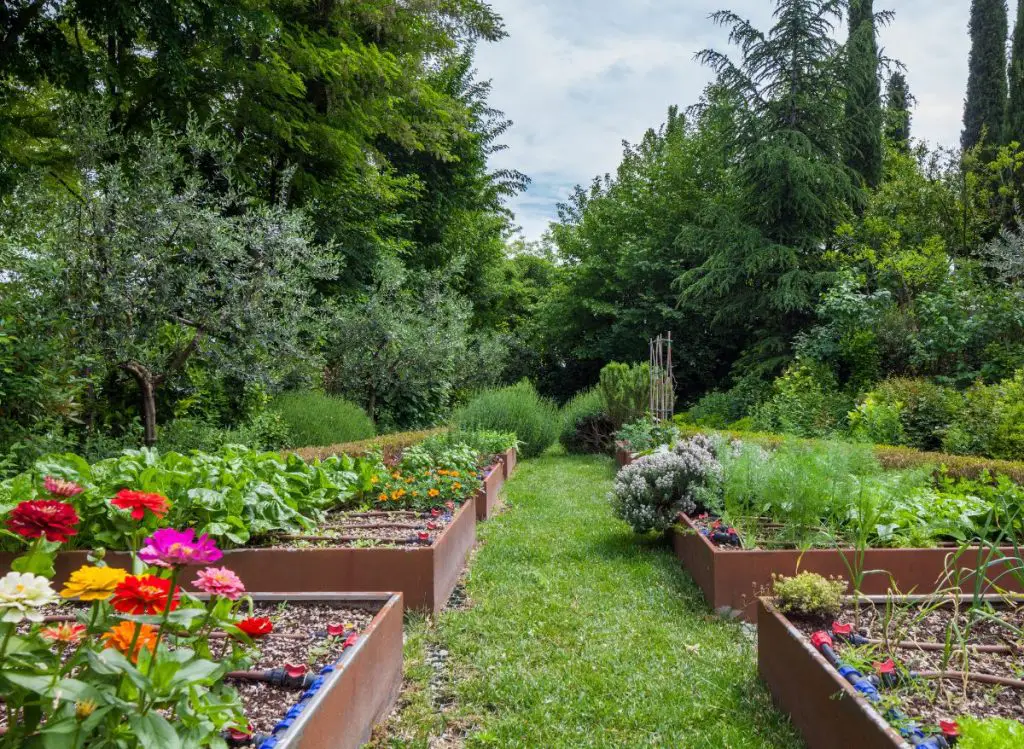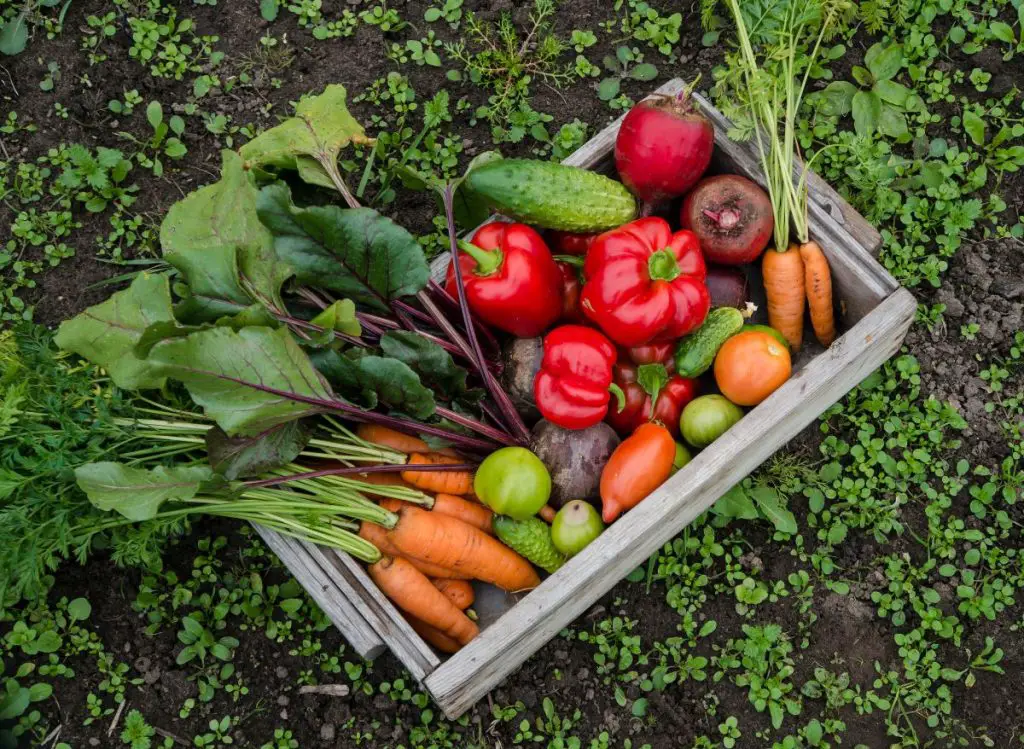
Gardens need plenty of nutrients to grow and look healthy. They need sun, water with good drainage, and soil. There are a multitude of nutrients in the soil that plants need to remain healthy and have the right pH balance, including sulfur, nitrogen, and phosphorus.
Sulfur is a necessary nutrient for a healthy garden, along with a few others. Sulfur helps balance other minerals that can be in your soil and keep plants healthy. You can test the amount of sulfur in your soil or from your plant leaves to see if you need to make some modifications to have the most nutritious garden.
Finding the correct amount of sulfur in your garden is a simple task. If you find that the amount of sulfur in your soil is too low or high, there are several things you can do to fix it. Sulfur isn’t the only necessary nutrient for soil health, but too much or too little sulfur can damage your garden.
Why Does a Garden Need Sulfur?
Sulfur is one of the many necessary elements that a garden needs to be healthy. Your garden doesn’t need a lot of added sulfur, but not having enough can harm your plants. Sulfur works in your garden with bacteria to create sulfuric acid. The sulfur’s nutrients help plants grow, are vibrant and strong, and maintain a healthy pH level.
Sulfur is needed to reduce the amount of sodium that occurs in your garden. You don’t need to test your soil’s sodium levels, but if your plants aren’t growing, are wilting, and the leaves are yellow, you may have too much sodium in your soil. When there is too much sodium in your soil, your plants act as if there is a drought and become dehydrated.
Sodium levels can be high in a garden from:
- Fertilizer and pesticide deposits
- Natural environments near saltwater
- Dry climate
- Inefficient drainage
An additional benefit to having sulfur in your soil is that it helps plants fight off diseases and prevents fungi from growing. There are sprays that you can apply to your plants as a preventative measure.
You should check your garden’s sulfur and nutrient levels every fall so you can plan for modifications during the winter before planting in the spring.
Testing your soil’s health is also important because if you need to add sulfur or other minerals to your soil, you need to rake and turn the soil, which can be difficult with already present plants.
Sulfur and pH Level Testing Methods
Testing the sulfur, pH, and any other mineral levels in your garden is a simple task. There are testing kits available that you can use to test nutrient levels. If you don’t have a kit, there are some other options for you as well. When you test soil levels, you should test multiple samples and take an average of the recorded amounts.
The most reliable way to test your soil is to send several samples to a lab for analysis. The lab can analyze the levels of nutrients and pH levels. You can contact your local garden center or a local university to see if they have a site you can bring or mail your soil samples to.
When you are using a soil testing kit, such as the Luster Leaf Rapitest, you can test the pH and nitrogen, phosphorous, and potash levels in the soil. You can also use a pH meter. Here’s a great video showing how to use a pH meter. Here is another excellent guide on testing the pH levels in your soil using pH test strips.
If you don’t have a kit or meter, or access to sending a soil sample to a lab, there are some basic ways to test the soil pH, but they won’t be as accurate as sending the samples to a lab or using a meter or kit.
These methods include adding vinegar or baking soda to soil samples or using the liquid from boiled red cabbage. Here’s an excellent guide showing how to do them.
What to do if There is Too Much Sulfur or Acid in Your Garden?
After testing your soil, you may find that there is too much sulfur. If there is too much sulfur, this can prevent your plants from absorbing nutrients. Having too much sulfur in your garden will make your soil acidic and destroy the roots of your plants.
If you have too much sulfur in your garden, you can add some powdered limestone to your soil. There are two common types of lime to add:
- Calcitic limestone quickly lowers the pH of the soil.
- Dolomitic limestone has calcium and magnesium and takes longer to lower the pH of the soil.

What to do if There is Not Enough Sulfur in Your Garden?
If you test your soil and notice that there isn’t enough sulfur, you can purchase sulfur at your local home and garden store or online. It isn’t extremely common to have not enough sulfur in your garden, but it can happen. This is because sulfur naturally occurs from the decomposition of organic matter.
Some other sources of sulfur with how to add it to your garden are:
- Composted manure: add directly to the soil. Do not use cat, dog, or pig manure.
- The air from burning fossil fuels and acid rain: you won’t have to do this intentionally.
- Compost is slow-acting, so you should add compost throughout the growing season.
- Gypsum: Check out this excellent video showing how to add it to soil
- Epsom salt: here’s a great video showing how to add Epsom salt to your soil.
Before adding sulfur or any other minerals to your garden, be sure to know what your plants need. Here is a chart that shows the pH levels required for many plants.
To learn how much sulfur to add to your garden, you can use a garden calculator. You can also find a reliable table for the correct amount of sulfur to add to your garden.
When making modifications to your soil, especially if there are already plants, gradually add the modifying minerals and blend them into the soil well. Test between additions to make sure you don’t add too much.
As mentioned earlier, some modifications react quickly, and others can take a month or two to react.
What Plants Need More Acidic Levels?
The sulfur level in your garden can also affect plants that need more sulfur to grow, especially plants that we eat. The amount of sulfur and other minerals in the soil can affect the quality and flavor of produce. Blue plants also need more acidic soil to give them their blue color.
Some plants that need higher levels of sulfur and lower pH levels in the soil are:
- Garlic
- Onions
- Mustard seed
- Legumes
- Most berries, especially blueberries
- Hydrangeas
When is the Best Time to Apply Sulfur to a Garden?
When you know that you need to add sulfur to your garden, the best time to do it is during the spring. Adding sulfur in the spring is done to prevent damaging your plants because the process of adding sulfur to the garden requires digging and raking the soil.
If you find that you need to add sulfur to your garden outside of this timeframe, you can gently transplant your plants to another area of the garden or into a pot to dig and rake the soil when you add sulfur. When it is done, you can replant your plants.
You can also add sulfur to the top of the soil in smaller amounts and then rake it into the soil to avoid damaging your plants. Test the sulfur and pH levels of the soil before each application.
How to Add Sulfur to a Garden?
Adding sulfur to your garden is simple. Once you have purchased the product that you need, whether it is complete sulfur or a mixed product, you can follow the bag’s instructions.
If there are no instructions, the best way to apply sulfur to your garden is to till the soil is at least 6 inches deep. Next, you sprinkle the sulfur into the soil and blend it with raking. You can then sow your seeds or replant your plants.
Read the instructions on the bag to know when you should be able to water your plants again. Most types of sulfur additions require about 15-20 minutes before being able to water your plants.
Make sure to retest the pH and mineral content a week or two after application because some nutrients can quickly absorb the soil and plants. Others will need to be retested for a longer time, such as 1-2 months or even up to a year, especially if you use dolomitic limestone.
Other Main Nutrients Gardens Need to be Healthy
Like humans, gardens need many minerals to remain healthy; sulfur isn’t the only one. Some essential nutrients are required for optimal garden health, and some minor nutrients can help your garden remain healthy. Sulfur levels are important because they allow plants to absorb these nutrients.
- Nitrogen is an essential element that plants need to grow. When added to the soil, it turns into nitrate, and plants absorb it to produce chlorophyll.
- Magnesium is needed to help produce chlorophyll. Magnesium helps transport phosphorous through the plant.
- Phosphorous is important for plant and root growth because plants absorb phosphorous and sulfur in a balanced way.
- Potassium helps plants with their immunity and drought resistance and aids in photosynthesis.
- Calcium helps strengthen the plant cells and prevent the plant from withering or becoming bruised.
Other Micronutrients Gardens Need
Outside of the major minerals that plants need for survival, there are also some other minerals that plants need to ensure healthy growth, such as:
- Manganese
- Boron
- Zinc
- Iron
- Copper
What to read next:
- Can All Succulents Survive Winter? Here’s What I Think
- Can Succulents Grow in Shade? Here’s the Truth
- Best Ways To Prepare Soil For Planting Vegetables.
- How Often Should You Be Watering Your Terrarium? This Often!
Wrapping Up
Sulfur is an essential mineral needed in the soil for a garden’s health. It helps plants absorb other minerals and lower your soil’s pH if it is too alkaline for the plants you are growing. It also can help remove sodium from your soil.
Test your soil every year, or if you notice any problems with plant growth, to know if you need to add sulfur or other minerals.

